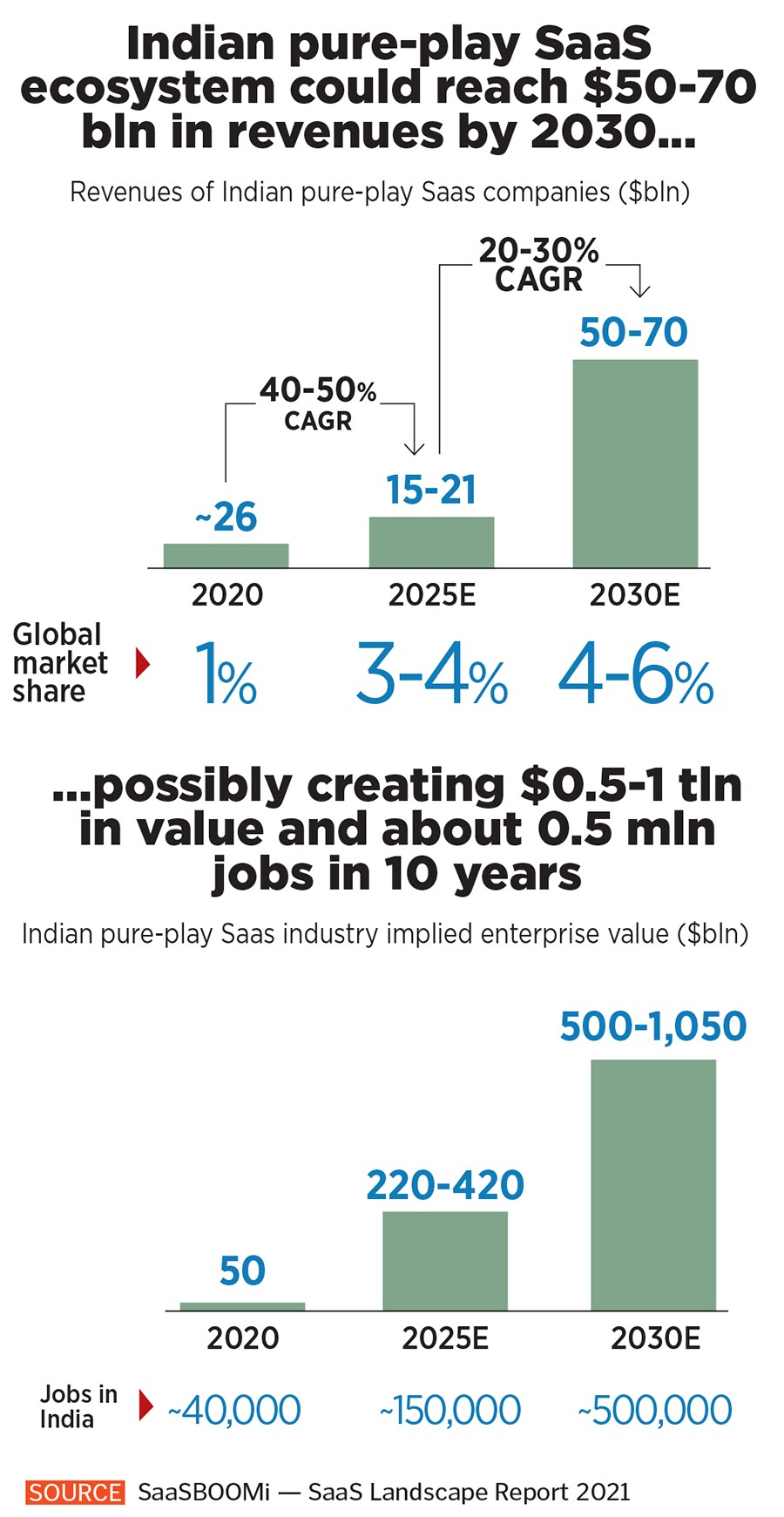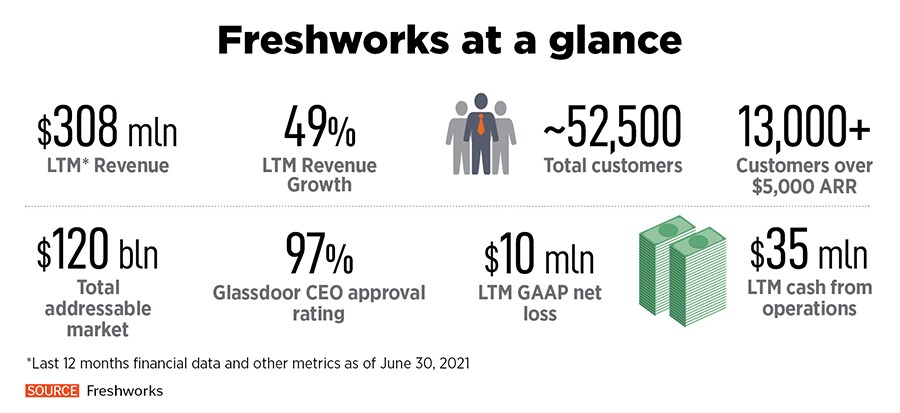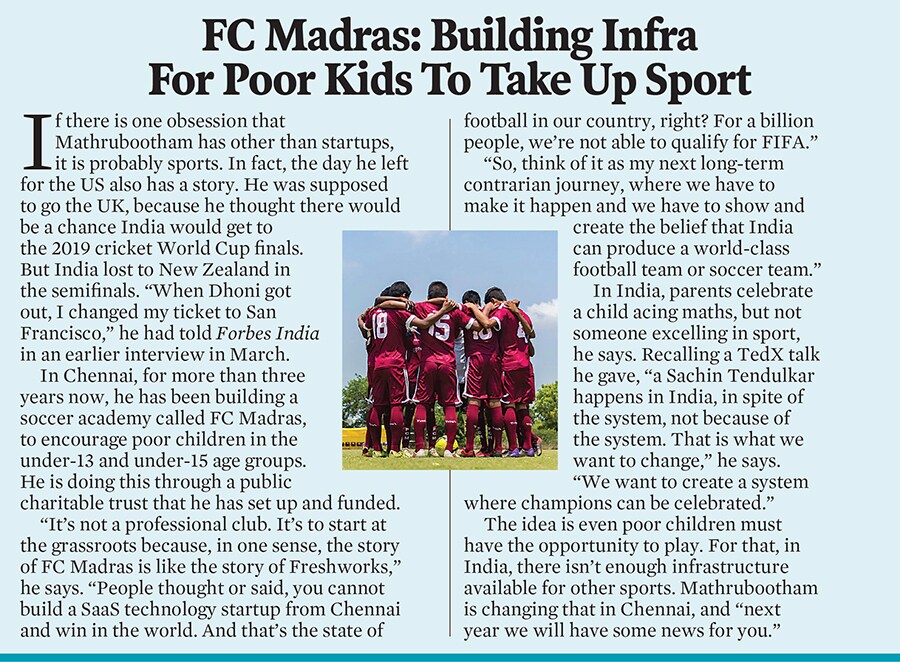“He even helped me get married," Parthiban recalls, but that’s for another story. Mathrubootham recruited Parthiban into Zoho and was his boss until he left to start Freshworks in 2010-11 (it was Freshdesk then). Sridhar Vembu’s Zoho Corp is widely considered India’s original software products company.
Mathrubootham rose to head Zoho’s Manage Engine product unit, before bidding adieu, after working for a decade at the company. A few years later, Parthiban joined him. Among Parthiban’s exploits was the blimp that everyone in Chennai’s software-as-a-service (SaaS) community knows.
“I was in the blimp," Parthiban recalls, a tad gleeful about it even today. He was running corporate marketing for Freshworks in 2018, and the blimp has often been called a piece of guerrilla marketing on the part of Freshworks, trying to cock a snook at its much, much larger rival Salesforce—a company that is counted among the pioneers of the cloud software subscription model or the SaaS model.
Timed to coincide with Salesforce’s annual ‘Dreamforce’ conference, the blimp circled around Salesforce tower, the tallest building in San Francisco. It had #Failsforce painted on one side of it. On the other side, it read ‘Freshworks’ and ‘Hit refresh’.
When Parthiban wanted to step out and turn entrepreneur, Mathrubootham not only encouraged him, but also invested in the new venture, Zarget. A few years later, Freshworks acquired Zarget, but Parthiban is back with his next venture, SuperOps. Mathrubootham hasn’t invested in SuperOps as it might compete with some parts of Freshworks, eventually, so the friends are avoiding conflict.
![]()
Parthiban isn’t the exception when it comes to Mathrubootham. He is, kind of, representative of the rule. Mathrubootham has personally invested in over 60 startups in the spirit of paying it forward. Today, there are several entrepreneurs with their own startups, who cut their teeth at Freshworks. They all continue to expand India’s SaaS ecosystem, the extended family or ‘Kudumba’—in Tamil language—that Mathrubootham loves.
Freshworks has always been an American company, but fiercely rooted in India, and Chennai in particular, where it still does most of its R&D and about half of its sales origination.
So when Mathrubootham moved to San Francisco, the day India lost to New Zealand in the 2019 World Cup, he never forgot to take his love of his SaaS Kudumba in India with him to America. And, after doubling the company’s annual recurring revenue run rate to over $300 million, when it was time to go public, that idea of an extended family found its way into the S1 prospectus at the Nasdaq stock exchange, which is also a Freshworks customer.
![]() “Kudumba is what binds us together. It celebrates our roots and reminds us of where we started. By creating a sense of family—Kudumba—we’ve been able to scale and grow," Mathrubootham writes in his prospectus.
“Kudumba is what binds us together. It celebrates our roots and reminds us of where we started. By creating a sense of family—Kudumba—we’ve been able to scale and grow," Mathrubootham writes in his prospectus.
On September 22, Freshworks Inc—the first Indian-founder-led VC-funded SaaS company to become a unicorn—also became the first such company to go public in the US. Its symbol is FRSH. The company sold roughly 10 percent of its stock, about 28.5 million shares, in the IPO, with the listing price of $36 a share. Freshworks started with an indicative band of $28 to $32, but as the price discovery process concluded, strong investor interest prompted the company to take that price higher.
The share price jumped over 30 percent on listing, taking Freshworks’ market value to more than $13 billion.
“It was an extraordinary experience," Shekhar Kirani, partner at Accel, the first VC firm to back Freshworks very early on, tells Forbes India, recalling the customary bell ringing ceremony of the IPO. “The atmosphere was one of high energy, excitement, a lot of exuberance and a sense of belonging for everybody who had come together."
“The best thing I heard from the head of Nasdaq was that in his 17-year experience, he’d never seen so much excitement and fun about an IPO," says Kirani, who’s also on the board of Freshworks.
In his own mind, Kirani admits to “so much of emotion going through", but also “thinking about the power of entrepreneurship." Starting from their humble backgrounds, Mathrubootham and co-founder Shan Krishnasamy, had risen to the first listing of a software product company from India in the US, and “I was thinking, what an example this was to any entrepreneur anywhere in the world… that was running through my mind," Kirani says.
For Mathrubootham, 46, it has been a decade of believing in the idea of building software products from India, as against IT services, supplying the necessary toil, evangelising it—alongside other like-minded entrepreneurs and investors—through multiple efforts that have now become large established networks of software product entrepreneurs and companies like Product Nation and SaaSBOOMi.
![]()
A zen dinner
In 2017, Mathrubootham and Kirani sat down to a dinner at an Asian restaurant called Zen in hotel Leela Palace, Bengaluru. Accel was the first VC firm to invest in Freshworks and Kirani was on the company’s board. “Girish, what do you want, in life? Do you want money? Or do you want glory?" Mathrubootham recalls the VC investor asking him. “Freshworks will continue to grow. You can probably sell the company and become a very rich man. Or you can take the company public and become famous."
“It’s not about what"s in it for me. That"s not important," Mathrubootham remembers his response. “But I always had this dream about India as a product nation." He points that Kirani and he were among those who were already working on initiatives like SaaSBOOMi. And one of the common things they were talking about was how to help the next generation of startups.
At the time, Kirani’s view, the way Mathrubootham recalls it, was that the biggest problem for startups in India was that exits were few and far between, there"s no IPO, and no big, meaningful mergers and acquisitions. The first big one, of Flipkart’s acquisition by Walmart, was still a year away. “So he said if Freshworks goes public… that would be like a fantastic moment," says Mathrubootham. And thus was born the dream of taking Freshworks public.
![]()
It would be like a bellwether moment, like Infosys being the bellwether for IT services, Freshworks could be the bellwether for SaaS product companies. “And I told Shekhar that"s what I want. I want Freshworks to really be like the Infosys for IT services. We want to be that company for SaaS products. And, we started dreaming about how that would energise the entire startup ecosystem (in India)."
If Freshworks had an IPO, more investors would believe in the India SaaS story because it would have demonstrated that one can start from scratch and build a sizeable software products company, out of India, and take it public in the US. That same year, a couple of months after that dinner, Freshworks had its internal employee annual day event, Refresh. “I still remember that towards the closing, I had a slide on the screen that said we would go public on the Nasdaq. At that time it was symbolic," says Mathrubootham.
Freshworks is only the first of a growing list of Indian-founder-led SaaS companies that is emerging. Chargebee Technologies, Innovaccer, Postman, Druva and Icertis are some other examples. And there is a whole new set of entrepreneurs too, even newer, some of whom will one day command $100 billion companies, says Manav Garg, co-founder and CEO of Eka Software (a SaaS unicorn), and a close friend of Mathrubootham.
![]()
Trillion-dollar sector
Entrepreneurs like Mathrubootham and Garg believe that India’s cloud software companies are to the country what the IT services industry was 20 years ago. Eventually, the SaaS companies will be much bigger, they believe. SaaSBOOMi commissioned McKinsey to study this prospect and the consultancy came back with a report in July that projects the Indian SaaS ecosystem to be valued at a trillion dollars in 2030, with half a million software engineers working in the sector.
“See, you have smart founders who are getting VC-funded, and working hard on solving big problems, and there"s an ecosystem willing to help them," says Mathrubootham. “And people who have scaled companies are coming in and helping those founders. It"s only a matter of time before breakout companies happen. It"s already happening now."
A couple of months ago, Mathrubootham and Garg teamed up with Shubham Gupta, a respected VC investor, and Avinash Raghava, a long-term evangelist of the software products movement in India, to form a new VC firm called Together. Mathrubootham credits Raghava for seeding the dream of a product nation in his mind.
And the IPO “is the dream of the production nation come true", Raghava says.
At Together, their VC firm they’ve raised $85 million as their first fund, and in addition to funding, they have brought in an initial network of some 160 founders who will play an active role in mentoring new entrepreneurs. “You have this avalanche or wave of startups coming. So I think it"s going to be big for India. I am a believer. I"m an optimist," says Mathrubootham.
And at Freshworks itself, Mathrubootham says the best is yet to come. “We are operating in three really large markets. We are innovating and setting the trend for the support product of the future, the CRM product and the employee engagement product of the future. And we still have a lot of headroom to grow." CRM or customer relationship management is an area in which demand for good software has grown so much that it has outstripped database management software.
“So as we keep our heads down every day, and execute in these massive markets, continue to execute on our mission to help businesses, understand more about their customers and employees and delight them, we can keep going for a long time," says Mathrubootham. “In that sense, we don"t have to do anything new to keep growing."
The company spends about 20 to 22 percent of its revenue on R&D, and new products and platforms are definitely on the anvil. Freshteam, for instance, is a product for human resources management and applicant tracking that Mathrubootham hopes will one day become a large business.
![]()
And then there is Freshworks Neo, a platform that shares its name with Mathrubootham’s dog, and offers a lot of essential services as foundational tools to customers, system integrator partners as well as Freshworks’ own developers. “Neo is named after Neo, the chosen one in the movie Matrix," says Mathrubootham. The dog is his family’s chosen one, and the platform is the company’s strategic asset.
Further, having high-energy talent in India also gives the company a bit of a cost advantage because good developers are expensive. Freshworks today has more than 4,400 employees, and about 33 percent of them are women, including four of the top 10 executive leaders at the company.
One really important factor that will influence Freshworks’ future success is that Mathrubootham has expanded his Kudumba to surround himself with some really high-calibre senior colleagues in the US. He likes to refer to them as those who have “been there, done that".
On to something
His friends in the industry also see him that way. “I think Girish’s biggest trait is his ability to learn faster than the (speed at which the) company is growing. And second is his ability to amalgamate the senior hires in the company really, really well," says Garg of Eka Software. He also points to Mathrubootham’s market insights, which led him to pivot from Freshdesk, a one-product venture, to Freshworks, with multiple adjacent products, which brought the company a “huge upside".
Mathrubootham emphasises that he didn’t have the experience of building a $300 million revenue company before getting Freshworks to that milestone. However, the people he is recruiting are those who have these experiences under their belt. “So I actually learn by surrounding myself with people who have been there and done that," he says.
In October 2020, Chief Revenue Officer Jose Morales joined Freshworks from Atlassian, an Australian cloud software success, that is listed on the Nasdaq with $2 billion in annual recurring revenue, and which recently hit $100 billion in market cap. “Jose was number two in Atlassian. He’s seen their $60 million to $1.8 billion journey," Mathrubootham says. He understands the power of product-led growth, says the founder, who last year gave up the product lead job to Prakash Ramamurthy, who came from Oracle.
If he were to work with pure sales leaders, they would never understand the power of product-led growth and the freemium model that SaaS companies often work with, explains Mathrubootham.
Morales played a role in bringing in his skiing friend Stacey Epstein, who joined Freshworks as chief marketing officer in March. Epstein has previously worked at companies, including SuccessFactors, where she saw its IPO. She has also been the CEO of a company that was acquired. Therefore, when somebody like her comes to interview with Freshworks and says that she is inspired by the culture and vision at the company for a customer-360-degree product, that is genuine validation, Mathrubootham says. It got him thinking: “Hey, we are onto something."
![]()
It was six months between the time when a recruiter first contacted Epstein about the CMO role at Freshworks and when things actually moved forward. Part of the feedback from the recruiter was that Mathrubootham was very picky. “I thought he was going to be difficult… like a typical Silicon Valley CEO who thinks they are better than everyone. But he is so the opposite," Epstein tells Forbes India. And getting under the tent, “we were in S1 drafting sessions very quickly".
Freshworks has a strong sense of self, she says. “It starts from G… we know who we are, we are authentic, we are genuine, we are focussed on companies of all sizes and all regions, and not just the big ones. We are accessible and humble." ‘G’ is what everyone at Freshworks calls Mathrubootham. Not to be confused with Google, which is an investor.
As head of marketing, Epstein felt like the definition and encapsulation of what Freshworks stood for wasn’t coming through yet. And that was only because Mathrubootham was a product-first leader and “it wasn’t like he was going to go on a stage and talk about it".
So the tagline that the company has adopted—‘delight made easy’—which is in its prospectus as well, came quickly out of a meeting with Mathrubootham and Ramamurthy. “What’s the essence of who we are? One is, we help companies delight their customers and employees, and our differentiator is that we do that fast, easy, accessible, affordable—that’s what makes Freshworks unique as a combination of the two," she says.
Tyler Sloat was CFO of Zuora for almost 10 years before he signed up with Mathrubootham around last May. He has seen three IPOs before and worked at five private companies and two large public organisations as well. "Many, many companies have tried to get him to be their CFO. You have to understand Zuora is all about subscription economy. And SaaS is basically a subscription business," says Mathrubootham, still sounding excited about getting Sloat on board. “He is like an authority on SaaS metrics. When he looks at our financials and P&L and says, ‘Hey, this is fantastic, and this could keep going’, I know we are on to something."
![]()
Culture is the closer
Sloat, a Stanford MBA, had specific reasons for joining Freshworks, and those reasons say a lot about what the company is and where it is headed. Sloat was looking to take some time off before he got introduced to Mathrubootham through a friend and at the time he didn’t know much about Freshworks. But when he did some research, “it became apparent to me that there were some special attributes", he tells Forbes India.
To even think about joining an organisation at scale—first, one needs “great products attacking big markets". And then there must be something in those markets that makes the products particularly relevant.
Freshworks’ products are built for the SMBs and that means superior usability, user experience and really easy onboarding experience. “To reach the Holy Grail of software, however, is to stay true to those three attributes," says Sloat.
Over time, as features and functionalities are added, the products become relevant to larger organisations. And that’s what Freshworks has done. “I would challenge anyone to name a company that has been successful by starting with building products for large enterprises and then successfully moving down to service the smaller ones," adds Sloat.
The opposite is difficult too, because companies start to tailor their products to the needs of larger customers and end up hijacking their own product roadmap. What Mathrubootham has ensured is that Freshworks stayed true to its SMB customer roots, but successfully innovated enough to win large customers too.
Now one can see really large businesses using Freshworks’ products to run their businesses. “But you also see us addressing this really long tail of small businesses that will pay a 100 bucks a month. That’s a really unique attribute," says Sloat.
“The closer, however, was the culture at the company," he adds. The codified aspect of that is a simple acronym—CHAT which stands for Craftsmanship, Happiness at work, Agility and Accountability and True friend of the customer. “And the fabric that holds the company together is the mindset of Kudumba," explains Sloat. He says this about Mathrubootham’s belief in the power of the Kudumba: “He is not kidding. It’s not just stuff that somebody would throw around and you don’t really live it. Freshworks really lives it, and it’s really impressive. It’s a culture of no antagonism and yet with a lot of accountability."
In the long run that’s what will tilt the balance in favour of Freshworks beyond its technological achievements, believes Sloat. “It’s what will keep people, as individuals, wanting to come back."
Wearing the CFO’s hat, Sloat says, “You kinda have to operate like a public company before you become a public company to have confidence to be a public company." And Freshworks has been operating like that for a number of quarters. And 2021 became the year when Sloat felt that the company had the rhythm and the internal processes to go ahead.
The A-list of bankers that are underwriting Freshworks at the IPO is another indicator of how far the company has come. That list includes Morgan Stanley, JP Morgan, BofA Securities and Jefferies.
Day zero
“Freshworks has this rarefied combination of scale, growth and efficiency," says Sloat. “And investors see that we are playing in a market that is ripe for disruption. The original cloud promise is broken. And Freshworks is bringing in software that can be used by the smallest business and the biggest, and get meaningful RoI (return on investment)."
He also points out that the IPO is a rest stop on a long marathon. “We should certainly celebrate it, but celebrate it for a day, and get back to work." He’s merely echoing his boss’s sentiment.
“The IPO is a significant milestone for Freshworks in India. And we will celebrate that as a big event for us, but the work does not end at the IPO. It"s really Day Zero," Mathrubootham tells Forbes India.
The real satisfaction lies in creating the next great SaaS company globally. Even a billion dollars will not get the company there, Sloat adds. A billion dollars would just be the next milestone, and then it would be time to ask, “How do we get to five billion and then 10 billion? If we continue to execute and innovate, they will happen", he says.
The Covid pandemic has played a role in boosting Freshworks’ relevance around the world. “There is a new normal in the way that companies are working and I really don’t think that we’ll go back to the legacy, 100-percent-in-office, very concentrated workforce," Sloat says. Covid has forced companies to figure out how to be more global and distributed and productive. “Tangentially what that means for Freshworks is more opportunity," Sloat says. “In every sector."
“I am just having the most incredible learning opportunity of a lifetime. And that"s what I enjoy and cherish, like everything else is a byproduct," Mathrubootham says. He thinks of himself as a sponge that can keep sucking in all these experiences from all these people he has succeeded in surrounding himself with. He’s made friends with the likes of Eric Yuan, CEO of Zoom Video Communications. And he is inspired by founders like Jeff Bezos, whose ability to run massive public companies and still keep the innovation and growth going he’d like to emulate. Perhaps the ‘Day Zero’ idea was inspired by Bezos’s motto of every day being ‘Day One’ at Amazon.
“That is what you want when you want to build the most iconic product company that has ever come out of India. You want to learn from the best and keep going," says Mathrubootham. “I"m not afraid to lose, but I want to keep it going. Like I want to learn and we"ll keep going."

 Girish Mathrubootham, Founder and CEO, FreshWorks
Girish Mathrubootham, Founder and CEO, FreshWorks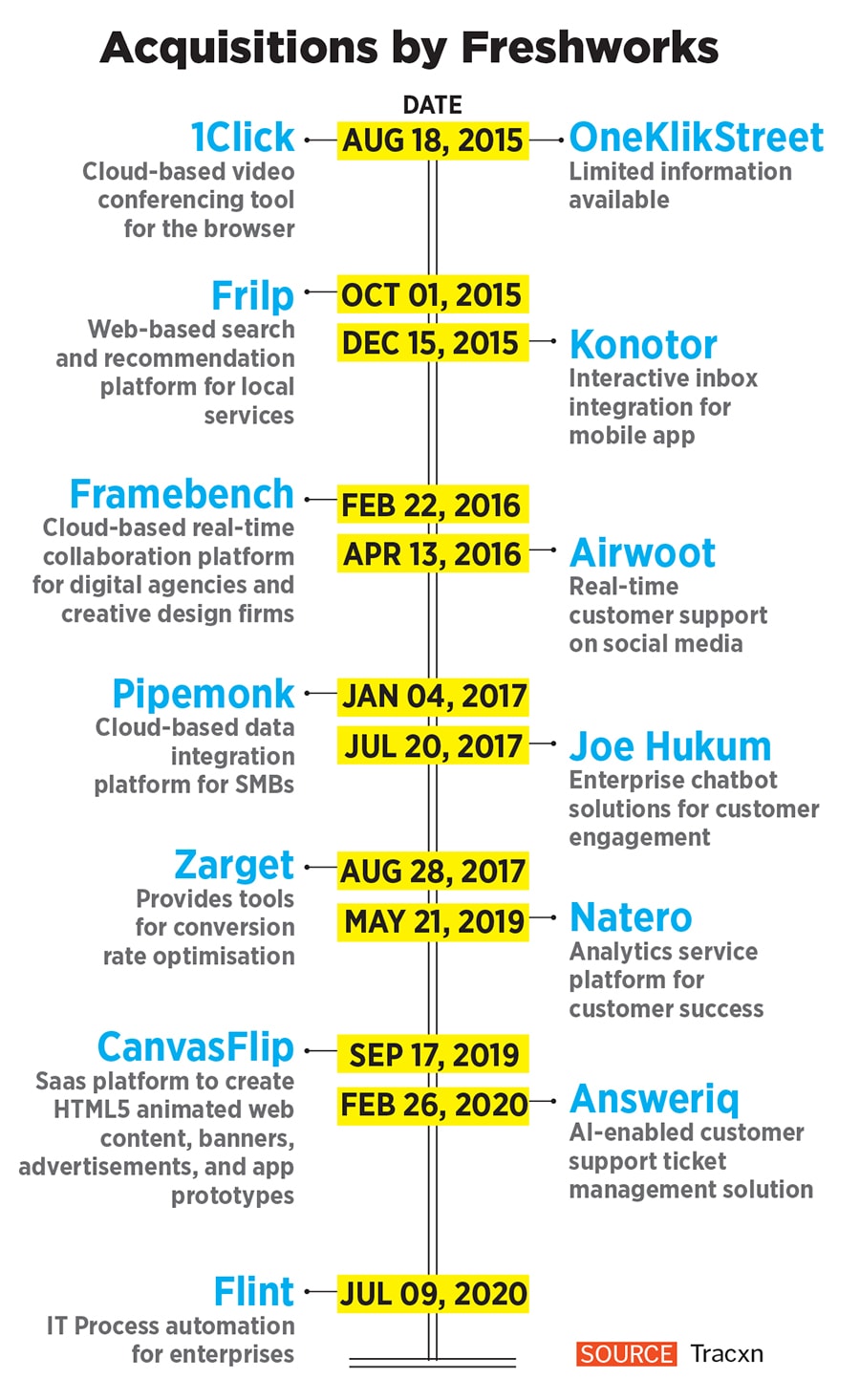
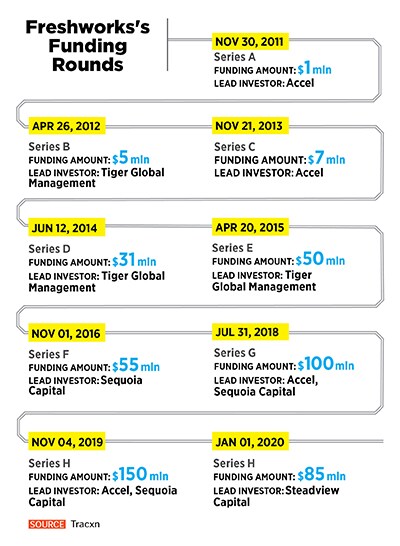 “Kudumba is what binds us together. It celebrates our roots and reminds us of where we started. By creating a sense of family—Kudumba—we’ve been able to scale and grow," Mathrubootham writes in his prospectus.
“Kudumba is what binds us together. It celebrates our roots and reminds us of where we started. By creating a sense of family—Kudumba—we’ve been able to scale and grow," Mathrubootham writes in his prospectus.
